June 30, 2004
6/30 - Phillipine mangroves: 1/4 of their baseline
“The country’s mangrove forests are now down to only about 112,000 hectares, from a high of about 450,000 hectares in the early 1900s.”

June 29, 2004
6/29 - Same, same: Fla. Gov. Bush calls for voluntary (= no) effort for oceans
We hate to get too political with our Shifting Baselines project, but hasn't this country had enough of calling for polluters to implement voluntary controls of their environmental destruction. We should try doing the same with violent criminals and ask them to voluntarily cutback on their violent crimes so we can keep government bureaucracy to a minimum.

Florida Governor Jeb Bush
June 28, 2004
6/28 - July 10 is MAKEOVER DAY at Shifting Baselines: NEW P.S.A. is a comin'!
On July 10 Shifting Baselines will release a NEW P.S.A. to be distributed by Banyan Communications to 70 tv stations in California and 5 stations in Florida. The PSA will premiere at the Blue Visions Conference in Washington D.C. July 11-13, and at the National Marine Educators Association in Tampa, July 19. The spot stars two brilliant comic actors and helps call attention to a major problem in the oceans (stay tuned to see what it is). We're also going to post a makeover of the home page and add a number of new features. Shiftin', Shiftin', Shiftin!

Tim Brennen (of The Groundlings) and Cedric Yarbrough (Deputy S. Jones
of Comedy Central's "Reno 911!") co-star in the new Shifting Baselines PSA
June 25, 2004
6/25 - Blocking LOST: "The UN is going to take over every little fishing pond in the world."
The UN Law of the Sea. It's good for ocean conservation, national security, and our domestic oil and natural gas industries.
At least two of these three should appeal to conservatives. So, why are extreme right-wingers opposed to LOST??
One word: multilateralism.
Check out an excellent account of the LOST political stew in Grist Magazine (a great contrast to Tom DeWeese's article in the previous post!)
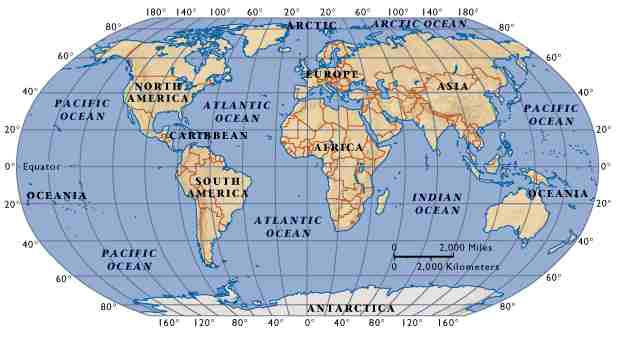
June 24, 2004
6/24 - LOST (the UN Law Of the Sea Treaty): Should it be ratified?
This is an anti-environmentalist assessment of the LOST which Senator Richard Lugar is currently trying to push through the house. What is interesting is the concession that if it passes, it will open the floodgates for a number of other major pieces of environmental legislation such as the U.N.'s Biodiversity Treaty.

June 23, 2004
6/23 - Tsuxiit and See: Culture clash over friendly orca
It's another classic heart vs. head conflict in British Columbia. The Native Americans are singing to Tsuxiit (pronounced sooke eat) the friendly orca while the evil scientists and veterinarians are gearing up to use their knowledge of whale behavior to return it to its pod.
Haven't we seen this movie before? There has to be a little kid involved in this storyline whose dad is a cold hearted vet, but the kid befriends the chief of the Mowachaht-Muchalaht tribe, and then, and then ... The big question is who's bought the movie rights?

June 22, 2004
6/22 - NOAA Annual Fisheries Report Released: "Mission Accomplished"?
"Just a flesh wound," was what the armless and legless black knight said in Monty Python's Holy Grail. There's a similar ring to this years annual "Status of Fisheries of the United States" report from NOAA. Last year's report was optimistic, this year's is downright celebratory.
The only thing is, I don't see how this meshes with all the fisheries guys I spoke with last year in Seattle who were deeply depressed about the unchecked downward spiral of major fisheries. We don't want to be too cynical, but establishing rules and regulations, and actually enforcing them, are two different things. I was told recently from a major authority that the second largest illegal trade in California, second only to drug trade, is illegal fishing along the coast. Lots of rules, no enforcement does not make for healthy fisheries management.
So why are we so skeptical of the NOAA report -- one answer, "Shifting Baselines." To celebrate the "rebound" of North Atlantic swordfish, which plummeted to extremely low levels, then showed a slight increase from "disasterous" to "near disasterous" is a true case of shifting baselines. Yes, its good to take hope in any progress, but to immediately declare victory and announce "problem solved" is like putting up a banner that says, "Mission Accomplished."
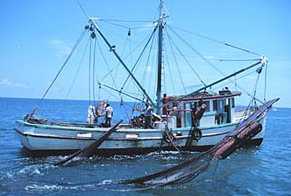
June 21, 2004
6/21 - MPA 4: “Many people thought the Great Barrier Reef was already fully protected”
… explained biologist Sylvia Earle, an explorer-in-residence at the National Geographic Society in Washington, D.C., and former chief scientist for the National Oceanic and Atmospheric Administration. "After all, terrestrial parks are not places where one expects to be allowed to cut trees, pick flowers, or kill the wildlife, and certainly not where large-scale commercial taking of the natural resources is considered normal."
Traditionally, Great Barrier Reef Marine Park has been open to commercial and recreational fishing. BUT, as of July 1, 2004 monumental new legislation will ban all types of extraction in one-third of the park, making it the largest fully protected stretch of ocean in the world. GBR Marine Park, which shelters the largest living organism on earth, protects an area roughly the size of Japan.
This is wonderful news, but let’s put it in perspective. One-third of the park (approximately 43,000 square miles) is 0.03 percent of the 1.4 million square miles of ocean that exist on this planet. Worldwide, less than 1 percent of the ocean is protected compared to more than 12 percent of the land! What’s up with that?
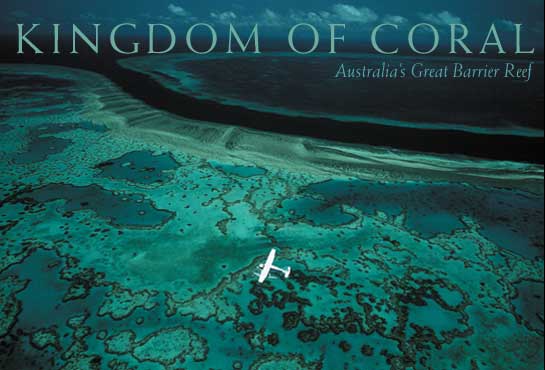
Photo credits: David Doubilet, National Geographic Society
June 14, 2004
6/14 - ANNOUNCING THE SB PHOTO AND CAPTION CONTEST: Deadline July 20
It's going to be quick, simple, and will hopefully produce some interesting submissions. Everyone has a month to send in their photos and descriptions, the details are here. The hallmark of our whole Shifting Baselines project to date has been the two pairs of before/after images created by Hollywood effects companies which we turned into lenticular images. As powerful as those images are, we figured it would be equally compelling to see people's real life version of them, or any other aspects of shifting baselines.
We have five excellent judges. Chuck Davis and Bob Talbot both live in Monterey, California, took part in our Roundtable evening last year (you can see them in the video) and are highly acclaimed underwater photographer/cinematographers. Dr. Jane Lubchenco of Oregon State University is a marine biologist who is a member of the National Academy of Sciences and recent recipient of the Heinz Award and a MacArthur Fellow. Dr. Steve Palumbi is a marine biologist at Stanford University who shook up the whale world last year as a co-author on a genetics paper in Science that questioned the baseline for whale population sizes.
And Norman Lear well ... according to the website of the Museum of Radio and Television, "no single individual has had more influence through the medium of television in its 50-year history than Norman Lear." I met with him over the weekend to discuss our project and I have never seen anyone grasp the concept of shifting baselines as quickly as he did. At 82 years of age he has watched a lot of baselines shift over the years, which is why he is working full time on his personal project, "Declare Yourself," a cross-country tour of college campuses to encourage new voters through PSA's, live spoken poetry, and music shows. And guess who does his website -- our own Tree Media.
Please spread the word on the photo contest. We're up for considering any and all submissions so long as they relate to shifting baselines and the oceans.
June 11, 2004
6/11 - John Kerry Talks About Shifting Baselines!
On Friday John Kerry said, "The news this week of an increase in jobs is a case of 'shifting baselines'."
Really? Okay, not really, but if I were his speech writer that is what he would have said because it's what he meant. He was pointing out how the slight increase in jobs reported this week is negligible compared to the large decline over the past 3 years. THAT is shifting baselines. He was urging the public to set their baseline at 3 years ago, rather than allowing it to shift to 3 months ago. This is yet another example of how important and powerful this term is. It is a very useful concept in critical thinking and there are countless examples of shifting baselines that arise in day to day life.

6/11 - "More than half of the world depends on the the ocean for their primary food source." Really?
Does anybody know if this is a fact? It is in an article in the Arab Times, reporting on a UNEP report. I've heard that a third of the world's protein comes from the oceans. But these huge numbers seem to get tossed around a lot.
June 10, 2004
6/10 - California: Maybe the Governator's okay
On Friday Jeremy Jackson and I attended a press conference beside the Scripps Pier at which the comments of California Governor Arnold Schwartzenegger were presented to the public by California Resources Secretary Mike Chrisman and head of California EPA, Terry Tamminen. The overall tone of things was pretty good.
It appears that Governor Ahnold has a genuine interest in the health of the oceans, and at least one of their four key recommendations -- opposing federal support of offshore oil exploration -- sounded like a major note of dissent from the current presidential administration.
Perhaps most impressive is just listening to Terry Tamminen, who is a long time environmentalist, having founded the Santa Monica Baykeepers and was Director of Environment Now. He was a fairly shocking choice for the position of head of Cal EPA, and you'd think he would know if the Governor is for real. According to Tamminen, the Governator means what he says, and really does want California to set an example with ocean protection. We'll see in the upcoming months as California considers COPA (the California Ocean Protection Act) and the MLPA (Marine Life Protection Act), which was cut from the state budget, but Tamminen assures everyone they are hard at work keeping it alive.

June 09, 2004
6/9 - Galapagos Cuke Wars Continue
There really is something wrong when the one place on earth that everyone seems to acknowledge ought to be biologically sacred given its role in our understanding of nature continues to be ravaged by humans. As I recall there was a fairly major oil spill there a year ago or so. And now Ecuadoran fishermen have been demanding the right to unlimited harvesting of sea cucumbers and lobsters. The folks from Sea Shepherd are there with their ship Farley Mowat and have been sending urgent updates on the conflict that has developed. It all sounds pretty sad.

Galapagos Islands: Home to unique species and cuke wars.
June 08, 2004
6/8 - Oh, mercy, mercy me, the oceans ain’t what they used to be
Marvin Gaye knew about shifting baselines before we did….maybe we could get P. Diddy or Britney to do a new version?

Mercy, Mercy Me
Written by: Marvin Gaye (1973)
Woo ah, mercy mercy me
Ah things ain't what they used to be, no no
Where did all the blue skies go?
Poison is the wind that blows from the north and south and east
Woo mercy, mercy me, mercy father
Ah things ain't what they used to be, no no
Oil wasted on the ocean and upon our seas, fish full of mercury
Ah oh mercy, mercy me
Ah things ain't what they used to be, no no
Radiation under ground and in the sky
Animals and birds who live nearby are dying
Oh mercy, mercy me
Ah things ain't what they used to be
What about this overcrowded land
How much more abuse from man can she stand?
Oh, na na...
6/8 - Complaints about Shifting Baselines
For about every 25 wonderful e-mails we get from people saying nice things about what we are doing with SB, we get the occasional anti-environmentalist who is basically irked with everything environmental, for which our dancing around with Hollywood celebrities represents the ultimate affront.
Here's the latest sample which arrived yesterday (we won't list the author's name):
Shifting Baselines? Maybe it should be called " Shifting Memory Lines?" Of course the state of many things here on this earth will be different now as opposed to 150 yrs. ago... or even 25 yrs. ago The earth IS changing, it has always been changing from the beginning of time, and it will always be changing, no power that man posseses will stop it. I do think the fish we harvest out of the oceans should be managed and it appears that is being done. As for the stories of: "you should have seen the ocean when I was a kid" It is a fantasy to think we should or can keep the state of the oceans, or anything else in this world in a dream-state, or "ideal" state year after year, generation after generation forever! I think most Americans are realists and they know that time and natural disasters, and an ever-increasing world population will change the world year after year.
Maybe this is like other exaggerated causes taken up by radicals who are confused about their own purpose in life and they desparately need a cause to make them feel like they matter? I genuinely hope this group is NOT successful in what usually happens when a group garners political support for their cause..... it translates into more laws restricting all American's personal reedoms to enjoy their enviroment, specifically our oceans... in US. waters. Did you know that people in Russia/ Ukraine have more personal freedoms than Americans do? but their economy is so poor it restricts them from enjoying it as they could.
Let's calm down and be thankful for what we do have, and not try so hard to get what we can't have, or shouldn't have. Accept that there are always going to be changes, they are not always bad changes, just different.
Yes, I've often heard that environmental conditions in Russia/Ukraine are the best.
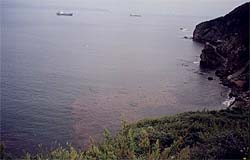
Pristine Russia: Oil spill on the Sakhalin coast
June 07, 2004
6/7 - MPA 3: South Africa protects almost 20% of its coast with MPA's
Do we see a pattern here? New Zealand, Canada, South Africa, all moving to protect their coastal resources with Marine Protected Areas.
6/7 - Norwegians: Shoot a whale, save the planet
Harvesting whales will stop global warming.
Okay, I'm extrapolating a little bit for my retarded relatives (i'm half Norwegian), but they LITERALLY figure that harvesting minke whales will cause fish stocks to grow and thus will be a good thing. And if that's true, then I figure that will result in more predators on zooplankton (the fish), which will reduce the abundance of grazers on phytoplankton, which will make for more phytoplankton sucking carbon dioxide from the atmosphere and thereby reduce global warming. Bingo! Shoot a whale, save the planet.
It's a shifting baselines nightmare.
June 05, 2004
6/5 - A Malibu Surfing Souvenir: Hepatitis A
It's fairly unbelievable. It's just hard to accept. The ocean is so vast, so diluting, how could it ever be dangerous to swim in? I think there is a built in time lag in accepting this. It will probably take a generation for it to really sink in. The idea that you are risking your health by immersing yourself in the supposedly-healing waters of the sea.
After a morning surf around Ventura yesterday, we stopped into a surf shop in Malibu where they were all talking about a local dentist who recently went surfing at Surfrider Beach in Malibu (which by the way got an "F" on Heal the Bay's annual report card a couple weeks ago) and immediately came down with flu-like symptoms, swollen glands, fever, and within hours tested positive for Hepatitis A.
Someone pointed out "the good news" is that you can get a shot and a booster for Hep A and be immune for up to 10 years. Oh great. So someday we will all have to go to the doctor to get shots in order to go surfing, just like getting ready to visit some distant country with poor health conditions ... but within driving distance.
THIS is the relevance of the term "shifting baselines" to everyone at Surfrider Foundation -- the idea that the public shifts its baseline to accept that certain beaches are bad news and you just have to know to avoid them ... and to never go swimming after it rains ... and to check the latest beach closure reports ... and ... all this, rather than get angry and do something about the unhealthy state of these beaches.
June 04, 2004
6/4 - US Oceans Comm. Report: Will the response to the study of ocean mismanagement be mismanaged?
Admiral James Watkins, head of the recent U.S. Oceans Commission, said the Commission found our ocean policy suffers from serious mismanagement. Now the big question is whether the response to the report itself is going to be mismanaged.
Ideally, the governors of all the coastal states were supposed to submit their comments on the report to the Commission by about now so that the Commission could forward their recommendations to the President in late summer and try to push him to actually DO SOMETHING with regard to the future of the oceans.
But the first deadline for the governors was extended to June 4, and now the National Governors Association is asking for more time, which will further slow down the process, and given the impending elections and all the other chaos ...
Won't it suck if the report that says, "we need to do something about the oceans," gets so bogged down that once again, nothing changes.
This, again, is why there is a need for a national movement of ocean conservation -- to pressure the government to actually do something.
Oceans Commission Chair Urges Closure Before Election Day
By J.R. Pegg
WASHINGTON, DC, May 25, 2004 – The nation’s governors are unlikely to get another extension to submit comments on the draft report of the U.S. Commission on Ocean Policy, says Commission Chair and retired U.S. Navy Admiral James Watkins. “This is not an end game - this is the start of a political process,” Watkins said. “But we want to get this in the political process this year.”
The Commission has already extended the comment period through June 4, Watkins told a House panel Thursday. He rejected calls by House Resources Committee Chairman Richard Pombo to grant the governors an additional 60 days.
Pombo told Watkins the extension through June 4 is not sufficient, citing a request by the National Governors Association for more time.
“Many of the state agencies will be closed over the long weekend of Memorial Day,” said the California Republican. “I implore you to give them that extension.”
California Congressman Richard Pombo chairs the House Resources Committee (Photo courtesy Office of the Congressman) Watkins, who appeared frustrated by Pombo’s focus on the issue, said the governors – and all other takeholders – have been involved in the process all along and have had plenty of time to consider the recommendations in the draft report.
The Commission gave all 55 state and territorial governors the 514 page report six days before it was released to the public on April 20.
The legislation creating the Commission only called for the report to be reviewed by coastal governors, Watkins said, but the commissioners felt it was vital to give all governors a chance to comment.
With the extension until June 4, they will have had “50 days of opportunity to comment on this,” Watkins said. “We have to terminate this commission at some point,” he told Pombo, noting that further delay would push the final report out to the fall and get it mired in the presidential election.
The retired Admiral said the Commission devised the report in an open and public manner that included 15 public meetings and provided many opportunities for input from local, state and regional stakeholders.
In addition, in the 90 day period after receiving the Commission’s final report, the President is directed to consult with state and local governments, and other interests, prior to giving Congress his statement of proposals to implement or respond to the Commission’s recommendations.
The scope of the task is daunting – the Commission’s report lays out some 200 recommendations for how the U.S. government should revamp and strengthen its commitment and framework for managing the oceans.
Current U.S. ocean policy is a haphazard mix of federal, state and local authorities and regulations. More than 60 congressional committees and subcommittees oversee some 20 agencies and permanent commissions with responsibilities related in some way to the ocean. These 20 entities are governed by more than 140 federal ocean related statutes.
“The current management regime is outdated and incompatible with emerging understand of ecosystems,” Watkins told the committee. “There is a lack of coordination, goals and funding at all levels.”
This has caused widespread mismanagement under a framework ill equipped
to respond to new environmental, economic and policy challenges.
As a result many species are overfished, coastal wetlands and estuaries that serve as nurseries are polluted and disappearing, commercial fishing interests are suffering, and invasive species are gaining a stronger foothold in many ecosystems.
“Our oceans and coasts are national assets in trouble,” Watkins said.
The report calls for the creation of a National Oceans Council within the Executive Office of the President as a means to elevate oceans issues to a higher political priority.
In addition, it calls for strengthening the National Oceanic and Atmospheric Agency (NOAA), which is the lead oceans agency in the federal government.
New Jersey Republican Jim Saxton told the committee he has introduced a bill to move NOAA from Commerce to Interior as a way to “provide a center for discussion on this very important issue.”
Watkins did not say he opposed the move, but said the Commission was focused on recommendations it thought were more politically palatable.
“It is more important to get NOAA strengthened before we tell it where to go,” Watkins said.
The Commission calls for a doubling of investment in ocean research, strengthening the link between coastal and watershed management, and implementing the national Integrated Ocean Observing System.
The cost of the Commission's recommendations is about $1.3 billion in the first year, $2.4 billion in the second year, and $3.2 billion annually thereafter.
The Commission's report calls for an Oceans Trust Fund to be established to pay for implementation of its recommendations.
The fund would use some $4 billion of the $5 billion annually collected as federal revenues from Outer Continental Shelf oil and gas development and would include any future rents from permitted uses of federal waters. The earmarked money currently goes into the U.S. Treasury.
Although there has been bipartisan praise for the efforts of the Commission, many lawmakers have raised doubts about the political feasibility of implementing its recommendations.
Lawmakers appeared skeptical of the plan to create the National Oceans Council and even less certain there will be support for setting aside a dedicated Oceans Trust Fund.
New Jersey Democrat Frank Pallone signaled concern about the use of funds from activities in federal waters to help fill the trust fund for the oceans.
“Many of my constituents fear that using these funds will only provide incentives to exploit our oceans even further and I agree,” Pallone said.
“We are not encouraging any of that,” Watkins responded. “Absolutely not.”
Future activities – namely aquaculture – are likely to occur, Watkins said, and if so Congress should use that money to pay for improved oceans research and management.
When asked by colleagues if the Resources Committee would act to implement any of the Commission’s recommendations this year, Pombo expressed his doubts.
“I am not sure it is possible to mark up legislation this session,” Pombo said. “They have not listened to anything the governors have had to say or anything the administration has had to say.”
Read the Commission on Oceans Policy's Preliminary Report online at: http://oceancommission.gov/documents/prelimreport/welcome.html
6/4 - Culture Clash: Enforcing fisheries in Galapagos and NZ is much easier said than done
Last week Ecuadoran fishermen in the Galapagos Islands protested limits on fishing there. Now Maoris in New Zealand are resisting similar efforts to curtail their fisheries practices by continuing to operate an illegal aquaculture venture. New Zealand government officials are trying to handle the situation delicately.
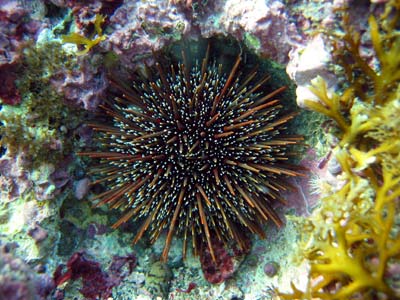
Kina - urchins being cultured illegally by Maoris in New Zealand
June 03, 2004
6/3 - "Ecology for a Crowded Planet": ESA committee is talking the language of SB
An article in last week's Science speaks very much in the language of Shifting Baselines -- urging scientists to accept that there are no longer any pristine ecosystems, and to accept the functional role of humans in all ecosystem dynamics. Here's an excerpt of an article reporting on the study:
An article to appear in the May 28 issue of "Science" calls for a sea change in how scientists study nature and the practices that are used sustain the environment. It's a plan for cooperation between science and technology that will be "music to some folks' ears and blasphemy to others," according to University of Maryland biology professor Margaret Palmer, lead author of the paper.
"We can't save nature just to save nature any more," says Palmer. "We have to figure out ways to meet human needs while conserving life's support systems."
The article, "Ecology for a Crowded Planet," written by a committee of the Ecological Society of America, advocates a radical new approach to environmental science - shifting from a focus on undisturbed ecosystems to one that acknowledges humans as components of ecosystems.
6/3 - "Mine's bigger": Cucumber Wars in Galapagos
Fishermen in the Galapagos Islands are protesting the limits set on their harvesting of sea cucumbers (does anybody really eat those things?). Notice in this article the use of the word, "pristine" to describe the Galapagos Islands. In your dreams.

A sea cucumber lovers dream.
June 02, 2004
6/2 - Kicking Bottom Trawling Out of California
A bill to sharply restrict bottom trawling along the California coast made its next step forward last week by scoring a passing vote in the California Senate, moving it on to the Assembly.
6/2 - Environmental Polls: A flimsy guiding light
If there's one thing they drilled into our skulls in film school it is the adage, "Show us, don't tell us" (which goes with "easier said than done," and "seeing is believing" and lots of other similar adages). These aren't just words for filmmakers, they are relevant to all aspects of human behavior. And it is relevant to the (largely absent) environmental movement in the U.S. today.
Environmentalists spend a lot of time pouring out their frustration over polls that indicate the general public is in favor of all sorts of environmental protection. Right now polls sponsored by the Packard Foundation show that the majority of Californians are in favor of MPA's and want their coastal resources protected. And here is a poll this month from the Yale School of Forestry and Environmental Studies that shows Americans are almost as concerned about the environment as terrorism (dream on).
Well ... saying and doing are two very different things. VERY different. These polls mean little. Ask me if I'm in favor of the government giving me a free income and I'll definitely say yes, but I'm not about to go out and do anything to make that happen. The same is true for environmental issues. For the most part, you can gauge the public's concern for the environment based on the ratings of television specials on the environment, and on the turn out for environmental events, and by the size and activity of membership in environmental organizations, and in the response of the general pubic of California to the governor chopping the $2 million for the Marine Life Protection
Act (the public response was nil).
There is no conspiracy that is suppressing the public's desire for a clean environment. The desire is just not that strong. There's plenty of potential for it to be ignited. But in the meanwhile, these polls are largely meaningless and no one should be deluded into thinking the public is sitting out there waiting for just the right campaign to come along. It's a tough business. The real catch phrase for environmentalism is, "Most people just don't care." The answer for
true environmentalists is, "But they CAN be made to care." And if you don't believe this just look what Lady Bird Johnson did for America in the 60's with litter removal. It's not impossible, but polls are a flimsy guiding light.

Sage Hall, home of the Yale School of Forestry and Environmental
Studies who released a new environmental poll last month.
June 01, 2004
6/1 - Hawaii/Cozumel/Catalina - Don't Call These "Publicity Stunts"
"Publicity Stunt," is a terrible way to dismiss the dedicated efforts of many important individuals. Last year an Austin businessman did a 20 mile swim in Cozumel, Mexico to call attention to coral reef decline, which he is going repeat on August 5 and extend to 35 miles. In September a group at Catalina, lead by veteran diver and guide Jon Council, will do a 50 mile continuous dive around the island to call attention to kelp forest decline. And this week Donna Kahiwa Kahakui will paddle her solo outrigger canoe the state of the ocean in Hawaii.
It's a trend. Ocean decline is reaching the state where individuals are getting so upset they are eager to do anything to help call attention to it. It is part of a growing mass movement that consists of a chorus of voices of all different shapes and sounds, each trying to do their part. Everyone from Paul Watson of Sea Shepherd (whom I once heard emphasize that everyone works in different ways and simply needs to contribute what they know how to do) to this summer's Blue Visions Conference. It's continuing to grow.

Marathon canoe paddler Donna Kahakui